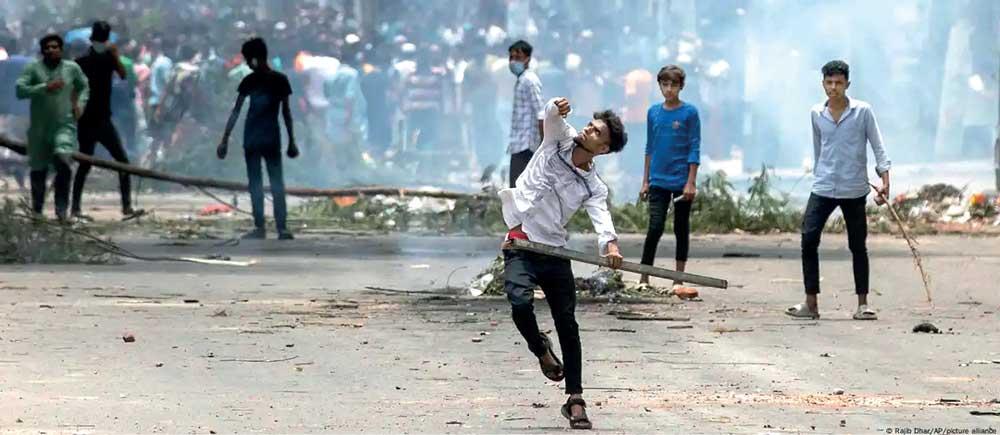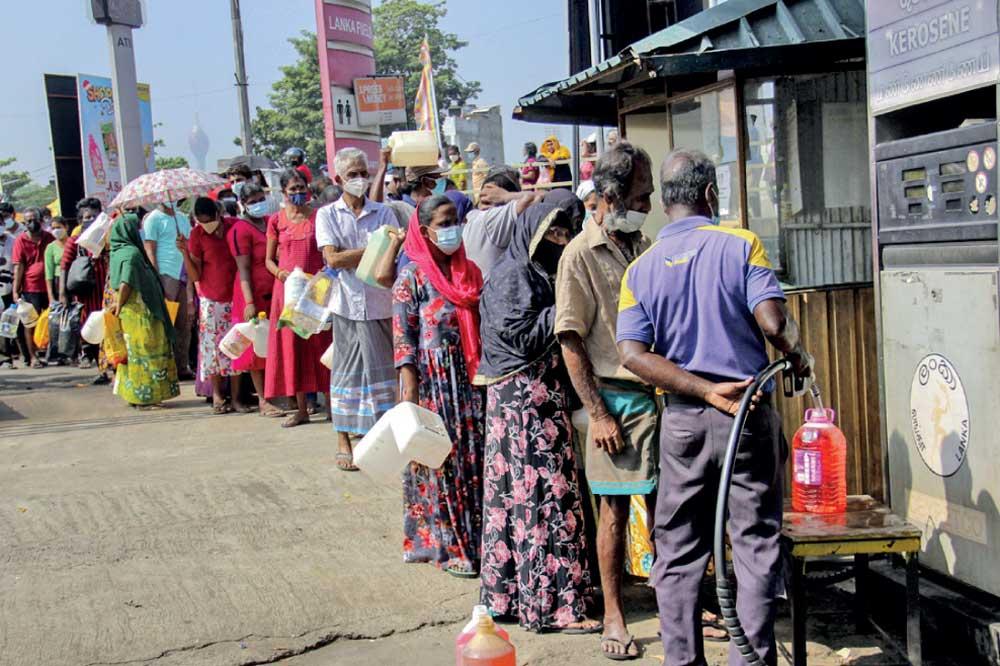Reply To:
Name - Reply Comment

Bangladesh is in a predicament today and is struggling to restore law and order In Sri Lanka, people took to the streets in the midst of economic hardships in terms of shortage of essentials, cooking gas and fuel
In Sri Lanka, people took to the streets in the midst of economic hardships in terms of shortage of essentials, cooking gas and fuel
The campaigners had argued that the system was discriminatory and needed to be overhauled. Although their request was largely met, the protests soon transformed into a wider anti-government movement backed by the opposition parties and activists who wanted to see the ouster of the prime minister
Mass agitations, originally initiated by students and later joined by the opposition parties, deposed former Bangladesh Prime Minister Sheikh Hasina-who fled the country- reminisce scenes that unfolded in Sri Lanka in July, 2022 when then President Gotabaya Rajapaksa was ousted from power through mounting public protests.
There are striking similarities between the two countries in this regard though the circumstances that fueled unrest and enormity of violence are different.
In Bangladesh, the protests began in early July after peaceful demands from university students to abolish quotas in civil service jobs; reserved for relatives of Bangladesh’s war veterans who served to gain independence from Pakistan, in 1971.
The campaigners had argued that the system was discriminatory and needed to be overhauled. Although their request was largely met, the protests soon transformed into a wider anti-government movement backed by the opposition parties and activists who wanted to see the ouster of the prime minister accused of being autocratic during her rule for the last 16 years and clamping down on democratic rights of individuals.
Crisis in Sri Lanka
In Sri Lanka, people took to the streets in the midst of economic hardships in terms of shortage of essentials, cooking gas and fuel. The shortage of fuel created snaking petrol lines near filling stations. The public transport sector was crippled. Parents were angry with no milk powder for their children. The crisis in Sri Lanka was triggered by the shortage of foreign exchange. Yet, in Bangladesh it was not for economic reasons at all. Compared to Bangladesh, the situation here was relatively peaceful. In Bangladesh there were more than 300 fatalities whereas the death toll was minimal in Sri Lanka.
In the aftermath of the protests, Bangladesh is in a worse predicament today than Sri Lanka. It is struggling to restore law and order. Looting and ransacking continue unabated. The interim administration that took control of the country is yet to firm up its grip on power.
In Bangladesh, nearly 80 hours after Hasina fled Bangladesh, amid violent protests, Nobel laureate Muhammad Yunus was sworn in to lead the country’s interim government.
At 84, Yunus took the oath of office during a ceremony held last night at the presidential palace in Dhaka. He now faces a challenging path ahead, as the nation may be on the brink of deeper political crisis; even reversing its economic momentum that set a shining example to the world.
The 17-member Cabinet, referred to as ‘advisers’ includes two key coordinators from the student-led movement, Nahid Islam and Asif Mahmud, and prominent Human Rights defender Adilur Rahman Khan, previously imprisoned under Hasina’s government for documenting rights violations.
The new Bangladesh Cabinet also includes economists, NGO activists, academics, and a retired military officer.
A major challenge lies ahead for the new administration governing with a Cabinet that lacks a democratically obtained mandate. Still, his administration is emerging from a mass revolution.
After a crisis of this nature, be it in Sri Lanka, Bangladesh or elsewhere, it is natural to experience unexpected outcomes. In Sri Lanka, Ranil Wickremesinghe whose party secured only one parliamentary seat at the 2020 General Elections became the President of the country. He took charge of the country before violent protest snowballed into the next step of laying siege to the parliamentary complex and taking control of it. The new government firmed up soon. Also, some activists that led the protest fell in line with the new government though they didn’t become part of it in any means.
In today’s complex world, local politics is always interlinked with international politics and cooperation. Well with the backing of key international players, Sri Lanka managed to restructure its debt servicing. In fact the debt crisis is at the root of the problems that triggered mass protests.
It is yet to be the case in Bangladesh, the current crisis presents an opportunity to put the country back on the path of genuine democracy and proceed with the economic growth momentum it sustained over the years.
The social, economic and political circumstances that fuelled violence in Bangladesh are different to those of Sri Lanka. Therefore, Sri Lanka’s approach will not work in Bangladesh.
But, Bangladesh needs to embark on the long task of rebuilding democracy in Bangladesh. There is fear whether Bangladesh will fall into the hands of religious extremism. Bangladesh is a country marked by a tumultuous history of military coups and counter coups. There is significant skepticism regarding the military’s current role as a result.
Bangladesh experienced military rule from 1975 to 1990; beginning with the assassination of its founding leader, Sheikh Mujibur Rahman. This period included multiple coups, particularly starting in 1977 under General Ziaur Rahman, who shifted the nation from a single-party socialist state to a multiparty system, though the military retained significant influence.
Following General Zia’s assassination in 1981, General Hussain Muhammad Ershad assumed the presidency in 1983. The military regime in Bangladesh ended in 1990 following a massive public uprising for democratic reforms, led by opposition parties and a strong student movement that staged strikes and protests nationwide, and compelled Ershad to resign in December 1990.
Despite all challenges, Nahid Islam, the coordinator of the movement and now an adviser in the interim government, has vowed to fulfill the promises made to the people during the mass uprising.
It is understandable that people in Bangladesh fear military rule. Khaleda Zia, the leader of Bangladesh National Party (BNP), has also been released from jail now. Her party is also aspiring to ascend to power now. In case her party wins, it will lead to retributive politics against Hasina’s Awami League as feared by some analysts.
Sri Lanka’s experience offers insights to Bangladesh during these challenging times. The rule of law should be restored before the situation spins further out of control. Here, soon after the new President took charge, further protests were quelled. Accommodation of key international players with deft diplomacy is also vital in today’s interlinked world to ensure diplomacy. The United States and India are keenly observing the developments in Bangladesh.
Similarities
Differences